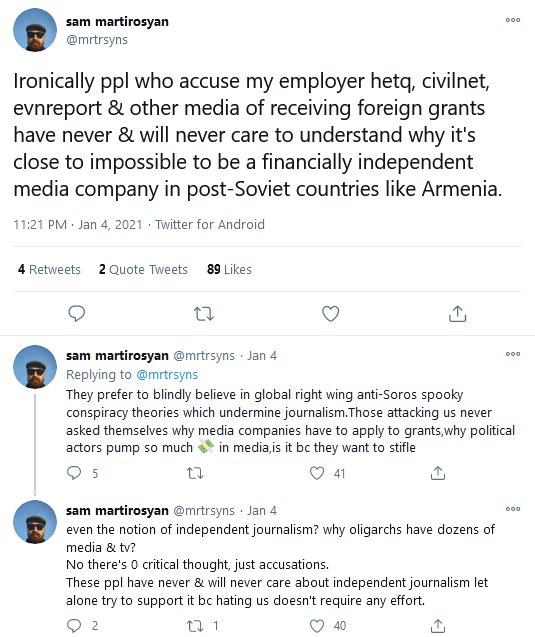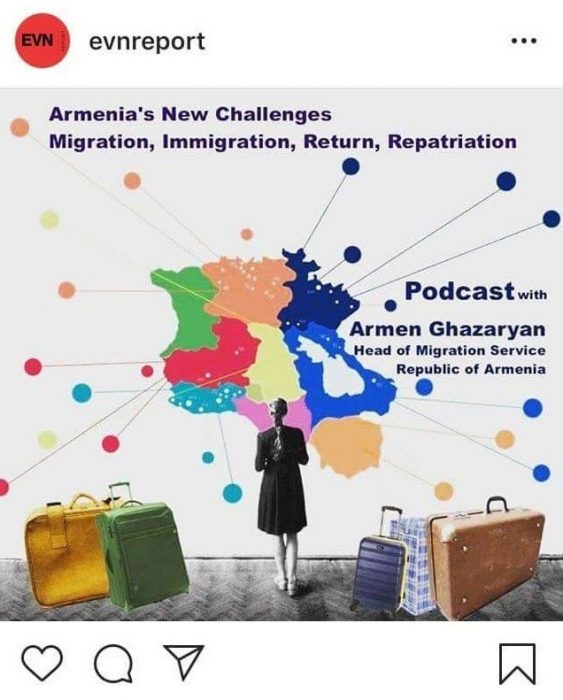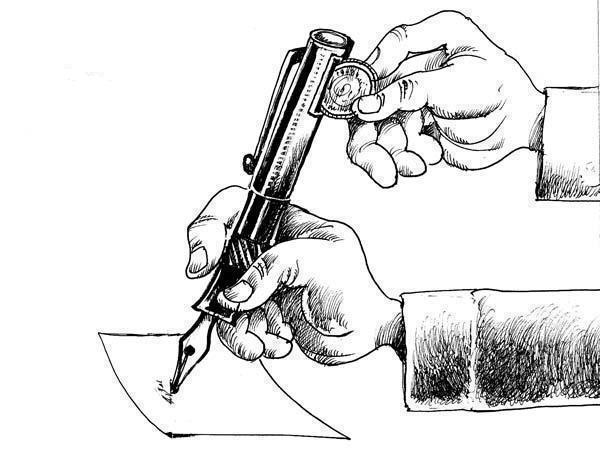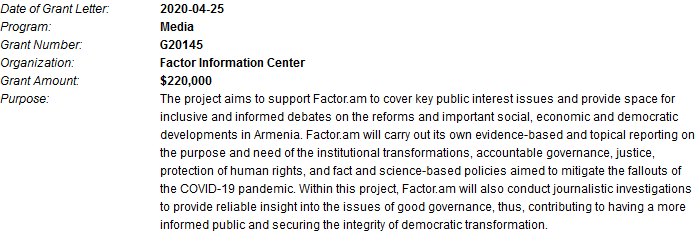Lithuania is a Baltic country that has a population of about 2.8 million people, roughly the same as Armenia. Lithuania is a former Soviet republic but it is a member of the European Union and because it is a member of the EU, Lithuania does not need democracy.
But what does Lithuania have to do with Armenia? I’ll tell you.
Recently, I saw a set of tweets by Sam Martirosyan, a Hetq journalist, who accused people like me of being conspiracy theorists (this is getting old but it works wonders for preventing critical thinking) for suggesting that the money received by Hetq, CivilNet, EVN Report, and “other media” (like Azatutyun? 1in? Factor TV?) influences their reporting and leads them to write and produce material that is not in the best interest of the country.

I’m glad he wrote this preposterous thing to which I can’t respond on Twitter because he blocked me there but which gives me an opportunity to offer him some of that critical thought he laments the supposed lack of. Thank you, Sam.
First, let’s register that he admits that media outlets operating in Armenia are funded by foreign governments and organizations.
To understand how ridiculous this is, think for a second what people would say if the major news outlets in America were financed in whole or in part by Russia, China, and Egypt. Azatutyun, for example, is the most popular youtube channel for news in Armenia – and it is wholly funded by the United States; Factor TV is the second or third most popular channel and it is heavily funded – to the tune of hundreds of thousands of dollars – by Open Society Foundations, founded by George Soros. What would be the reaction in the US if CNN was owned by Russia, MSNBC was funded by a Chinese NGO, and Fox received most of its funding by the Egyptian Institute for Good Governance?
You don’t need to guess. The United States spent tens of millions of dollars to investigate Russian involvement in the 2016 US presidential election and among one of their prize discoveries was that the Internet Research Agency, allegedly affiliated with the Kremlin, spent $100,000 on Facebook ads. For contrast, Open Society Foundations gave Factor TV over $223,000 in 2019 alone.
The merits of the investigation in the US are secondary to the seriousness with which some people within the country treated the possibility of a foreign country’s interference in the internal political affairs of the country.
But, when it comes to Armenia, there is no such concern. Why?
Second, a simple question: is Armenia the only place on earth where you get money for free?
The people receiving the money always pretend like the money comes with no strings attached. “Yes, we get tens or hundreds of thousands of dollars but it doesn’t affect what we report on.” Does anyone take this argument seriously? Are we to believe that these foreign governments and foreign organizations pass money out just out of the kindness of their hearts? Are we the fools or are the ones telling us this the fools?
But you know what? I don’t care to speculate. I will show you that this is nonsense.
The grants that are provided by these foreign governments and foreign organizations have clearly demarcated objectives they’re supposed to serve. Now, they don’t say “funds to be used for the overthrow of the government,” but they say things like “improving civil society,” which is grant world code language for promoting the activity of the professional activists also funded by these same outfits.
All the media outlets that take money from foreign governments and foreign organizations (yes, including George Soros’ Open Society Foundations – why this is called a conspiracy theory is beyond me when the information is available on his own websites?) love making the argument that they wouldn’t exist if it weren’t for these foreign grants but insist that the money comes with no strings attached.
Factor TV funding provided by Open Society Foundations
Could it be a coincidence that CivilNet produced so many pieces having to do with telling Armenia’s population that Armenians and Azeris lived in peace? Is it a coincidence that Hetq published garbage pieces that defamed Kocharyan and the Church? Maybe it’s a coincidence that EVN Report didn’t include Artsakh or Syunik in a design they posted that included what was supposed to be a map of Armenia.

Everything is a coincidence. Just like how it must be a coincidence that other countries where these governments and foreign organizations finance similar operations – anybody remember Ukraine or Georgia? – also seem to have a very similar end: instability, war, loss of land.
Fine, say you don’t see the problem in having foreign-financed organizations and people literally corrode society from within, making it incapable of building an actual civil society that is organized around common principles that the people, in fact, already shared. Why is this financing necessary?
Because, as Sam Martirosyan of Hetq says, you can’t be financially independent without the foreign funding in post-Soviet countries.
Except there are financially independent media outlets in Armenia, what about those? “They’re owned by oligarchs!” he says.
The oligarchs!
Ah, yes, the big, bad oligarchs. Any time you need to make an argument in Armenia to justify feeding at the teat of foreign powers, just mention “oligarchs” and people don’t listen to the rest (again, Pavlovian response).
Of course you know what they mean when they say the oligarchs own media outlets, right? They just mean locals. But not the locals who wear t-shirts, hang out at Impact Hub, and eat hors d’oeuvres for dinner, they mean those scary Hayastansi men who wear leather jackets, smoke, and eat skewered pieces of fatty meat. They mean the ones who are businessmen who made money in the chaotic and often violent environment, an environment in which they and their kind couldn’t survive in so they fail to understand how anyone else could. Because they and their kind couldn’t survive in that environment, they fail to understand how anyone else could have and, if those people did, they deserve to be called names. So, they call them oligarchs, the same people whose hotels you stay in, restaurants you eat at, supermarkets you shop in, and products you buy; the same people who kept the country running while the people who accuse them of being oligarchs today were fleeing that same country.
Some of these businessmen chose to go into media and now people like Sam Martirosyan of Hetq tries to justify taking money from foreign governments and organizations because locals they don’t like spent their hard-earned money on the media business.
But what about Lithuania?
Well, like I said, Lithuania is a member of the EU so it doesn’t need democracy. So, there is not RFE/RL (Azatutyun’s mother organization) in Lithuania. Open Society Foundations doesn’t fund media in Lithuania. The major media outlets in the country – run by the state and oliga…I mean businessmen – aren’t primarily funded by grants.
And guess what? There are only a handful of them. You know why? Because a country that has a population of about 3 million can only sustain a few of these. You know why? Because there is no need for more. Even massive media markets like New York, Chicago, and Los Angeles can rarely sustain more than a few media outlets on their own populations alone; in fact, they rarely do.
Armenia has dozens of media outlets and many, if not most, are funded by foreign governments and foreign organizations. These aren’t specialized newspaper, like a few for arts, a few for sports, a few for literary criticism, a few for music (you know, the things that actually help build civil society), but general news that, somehow, coincidentally, were anti-government when Robert Kocharyan and Serzh Sargsyan were the presidents. Somehow, coincidentally, they agreed on casting a shadow on the government’s trustworthiness, institutions like the army and the Church, on the validity of elections, on the heroism of heroes.
Could it be that these outlets are needed not by Armenia but the foreign governments and organizations that fund them? Could it be that they serve a purpose other than the emollient objectives they announce? Could it be that it’s unhealthy for Armenian society to be so heavily influenced by outlets that owe their very existence to non-Armenian sources?
But the really interesting thing about Lithuania?
In May 2019, it banned the editor of an outlet funded by a foreign government because the country determined that he was a “threat to national security.”
Everyone else seems to do what they believe is in their country’s best interest, why don’t we?





Thank you for this.
[…] might ask why there is so much foreign money in Armenia specifically targeting the media. An anachronistic myth persists that the Armenian media landscape is overwhelmingly controlled by government […]
[…] ask why there is so much foreign money in Armenia specifically targeting the media. An anachronistic myth persists that the Armenian media landscape is overwhelmingly controlled by government […]
1.First of all, the fact that there is media unfreedom in Armenia is evident for everyone. But just blaming several private media channels by saying that they have not trustworthy news is not the right thing to do. Many Armenian channels, including a well-known Armenian H1 tv, funded by the government, are indeed one of Armenia’s most biased TV channels. During the elections, many political parties complain that this channel refused to post their videos or pre-election messages without giving any valid reasons
2. Secondly, many other TV channels are owned by certain politicians or business people and other people of power. These channels also try to brainwash many people and make them believe in false or accurate things. And all these channels, including the national H1, are not funded by foreign organizations and are even more viewed than the channels mentioned in the article(EVN report, Civil Net). However, the way they try to report the news is even worse for our society because people tend to believe these national TV Channels.
3.And finally, I see no point in comparing Lithuania with Armenia. Two different countries with entirely different inter-political, geopolitical, social, and cultural bases and issues.
Before blaming these TV Channels, we must start with our national ones and then go to the TV channels that foreign organizations fund.